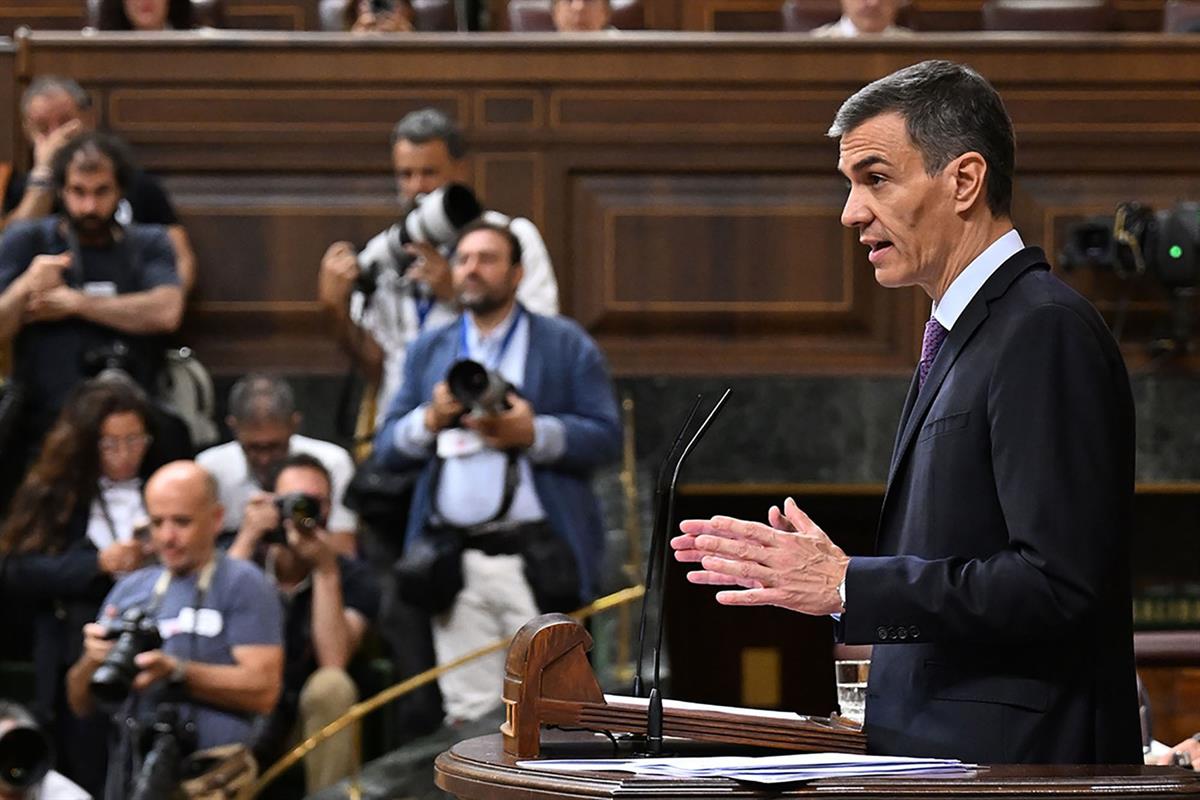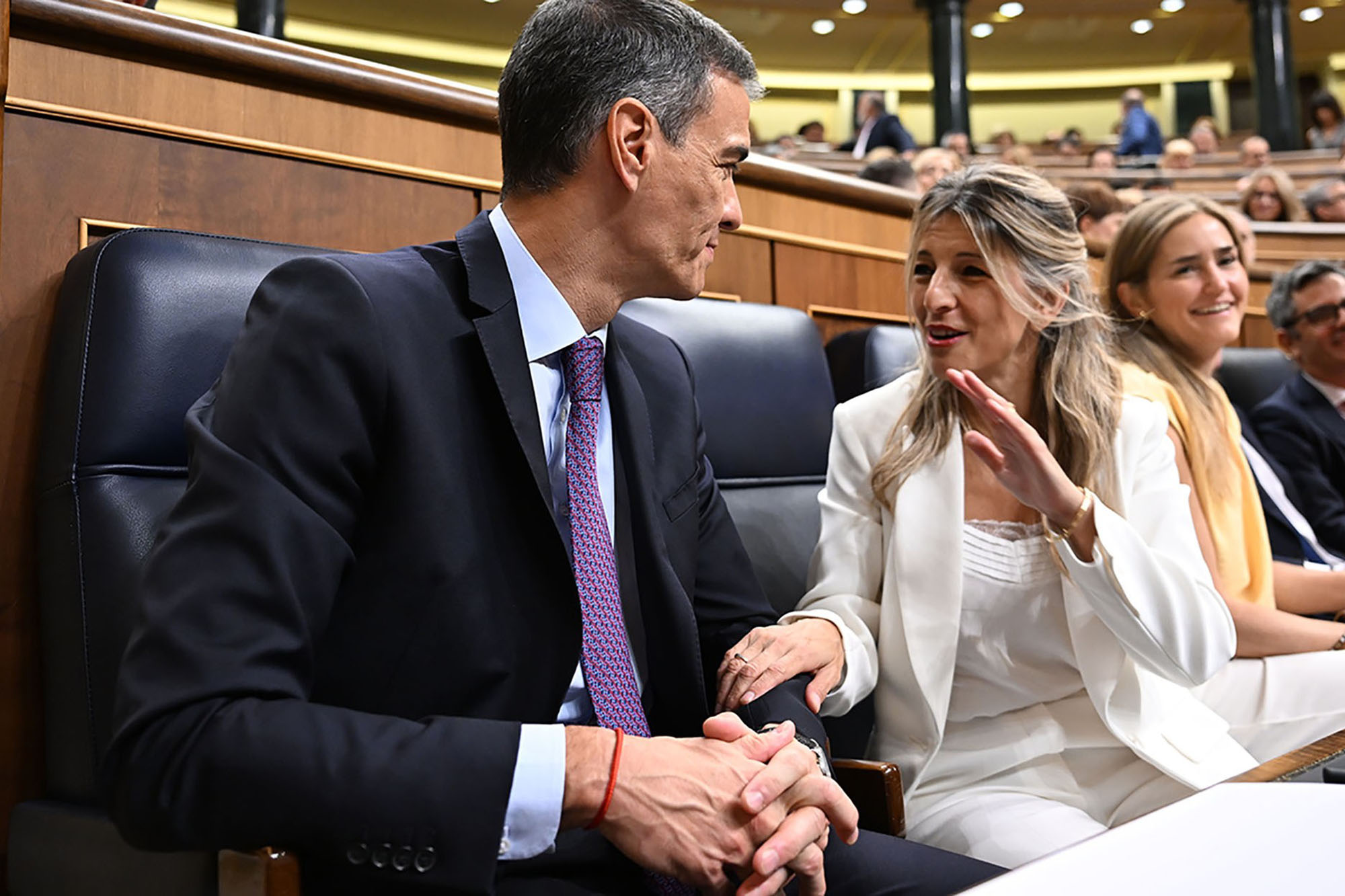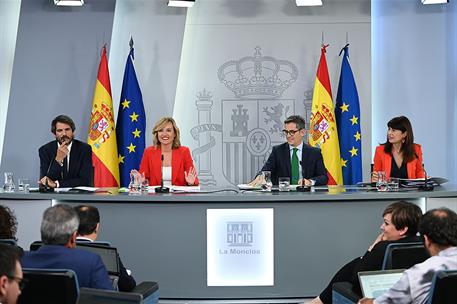Appearance in Lower House of Parliament
Pedro Sánchez announces a State Plan to Combat Corruption
President's News - 2025.7.9
Lower House of Parliament, Madrid
 Borja Puig de la Bellacasa
Borja Puig de la Bellacasa
The President of the Government of Spain, Pedro Sánchez, has announced the launch of a State Plan to Combat Corruption in the Lower House of Parliament, where he appeared to give an account of the corruption case involving the last two Secretaries of Organisation of the Spanish Socialist Workers' Party.
The leader of the Executive began his speech by reiterating his apologies to the public in relation to this case: "The guilty party is the one who commits the crime. And that is for the courts to determine. But I, as the person who appointed them, bear some responsibility and I accept this", said the president, who has defended being a "clean" politician and has vowed that he "will not throw in the towel".
The announced plan, described by the president as "ambitious, realistic and honest", has been drawn up in collaboration with the Anti-Corruption, Integrity and Governance Division of the Organisation for Economic Co-operation and Development (OECD), following meetings with parliamentary groups and civil society experts. It is structured around five axes comprising a total of 15 measures.
New public agency to fight corruption
The first pillar of the plan, which focuses on crime prevention and strengthening corruption controls, includes the creation of an Independent Public Integrity Agency, which will assume key functions in the prevention, oversight and prosecution of corrupt practices.
In addition, the fraud prevention methodology applied to the awarding of funds under the Recovery, Transformation and Resilience Plan will be extended to the entire State Administration, and artificial intelligence applications will be introduced in the Public Procurement Platform to identify signs of corruption.
The president added on this point that anti-corruption compliance control systems will be demanded of companies wishing to enter into contracts with the different administrations and, on the other hand, controls over political parties will be reinforced "to guarantee that those who manage public resources do so with the highest standards of transparency and integrity".
In this regard, the plan proposes making external and independent audits mandatory for parties and their foundations with public funding of more than 50,000 euros, and reducing the threshold for publication of donations to 2,500 euros and the deadline for publication to one month from receipt.
Protecting whistleblowers and strengthening sanctions
The second pillar of the plan addresses the protection of those who come forward to report alleged and potential corruption. "In a mature democracy, whistleblowers are not punished. They are listened to, protected and supported", stressed Pedro Sánchez, who pointed out that Law 2/2023 for the protection of whistleblowers is insufficient for this task.
Therefore, the plan proposes including in the new Criminal Procedure Law the requirement that any person who goes directly to the Prosecutor's Office, the police or a judge to report acts of corruption should have full guarantees of confidentiality, protection and legal support. Companies will also be required to have internal whistleblowing channels and all public administrations will be obliged to incorporate these channels into a general system of institutional integrity.
Strengthening the state's capacity to investigate and punish cases of corruption is the main focus of the third pillar of the strategy, which includes, among other actions, the creation of specialised sections for crimes against public administration within the new courts of first instance and the implementation of a summary procedure for cases involving public officials.
"If we want to put an end to corruption, we have to prosecute the corrupt, but also the corruptors", continued Pedro Sánchez, "because behind every bribe there is someone who receives, but there is also someone who pays". On this point, the president announced that the penalties for crimes against public administration in the Penal Code will be toughened, the statute of limitations will be doubled and fines for corrupt companies will be increased, calculated on the basis of their annual income. There will also be a "blacklist" of companies convicted of corruption to prevent them from continuing to enter into contracts with the administration.
 Pool Moncloa / Borja Puig de la Bellacasa
Pool Moncloa / Borja Puig de la Bellacasa
Recovering stolen assets and promoting a culture of integrity
Finally, axes four and five of the plan include measures for the recovery of assets stolen through corruption and the promotion of a "culture of integrity" which, as the leader of the Executive has pointed out, "permeates our public administrations, mobilises citizens and also holds the private sector to account".
Thus, in order to "return to the public what belongs to everyone", resources and staff numbers at the Asset Recovery and Management Office will be increased and the figure of administrative or preventive confiscation will be created, which will allow the seizure of assets linked to criminal activities without the need for a prior conviction and not only linked to the criminal sphere. And to "generate a true culture of integrity", opinion polls will be conducted, awareness campaigns will be launched and training for public employees will be reinforced.
Regarding the monitoring of all these measures, the president explained that an evaluation system will be put in place that will report on the progress made 12 and 24 months after the activation of the plan. "We will overcome the corruption crisis with deeds, with measures, with reforms and structural transformations that will strengthen our democracy and shield our institutions from the greed of a few people," he concluded.
Non official translation






